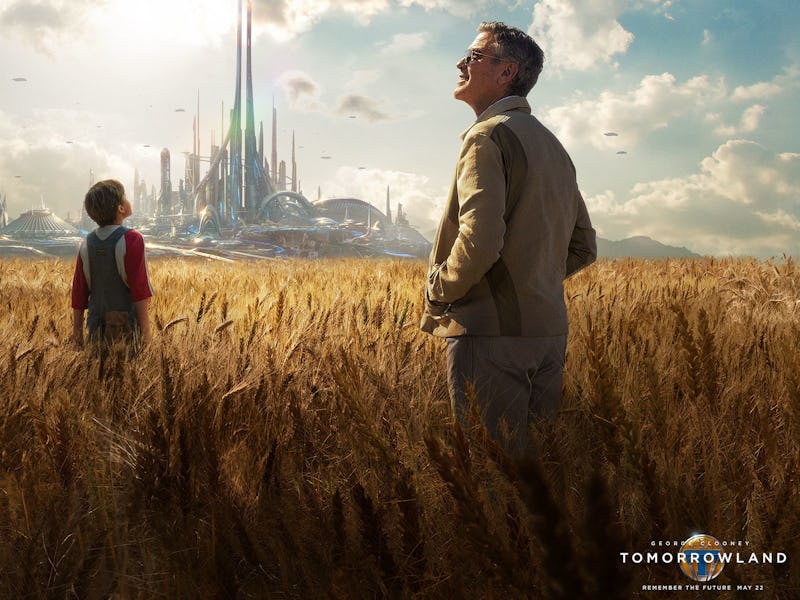The Casual Use of Force Is the Dumbest Thing About 'Tomorrowland'
Turns out the future is crassly violent

To sell its Tomorrowland as a mashup of movies that were actually enjoyable, Disney touts a couple of director Brad Bird’s previous credits, The Incredibles and Mission: Impossible — Ghost Protocol. In fact Tomorrowland does take cues from both of these films, but only in the dimmest way possible: informing the numb, aimless, and totally gratuitous violence in what should’ve been a rad imagination movie for kids instead of a festival of casual street executions.
You get a sense of it in the third trailer, actually, the pew-pew-pew aspect of the movie. The burnings, zappings, explosions, and assorted mayhem in this siege suggest George Clooney and Britt Robertson must have pissed off the wrong evil empire.
Turns out these minions are the secret cyborg police, or something, sent back in time from Tomorrowland to — kill, I guess, these characters? Spoilers ahead: Clooney's character went to the future-city Tomorrowland as a kid and managed to get himself exiled. Now can't make any contact with the place lest he, uh, apparently get vaporized. Along the way, as well, these future cyborgs literally smoke at least four bystanders: three cops in Houston and a security guard at the Eiffel Tower. Zap, poof. Their deaths are comically bloodless, in the way you'd expect in a video game where vanquished enemies flicker out and disappear.
Now, it's not as if there aren't good movies to be made about sending cyborgs back in time to, like, terminate people. But when those are the stakes, a movie has be clear why those are the stakes. Because to shoot people to death, even characters like "Sheriff" and "Deputy #1" who are just hanging around doing their jobs, sets up a grim ethical construct. Any villain who thinks nothing of obliterating human beings better be Skynet-level sinister. The nifty retro laser blasters the evil cyborgs in Tomorrowland use to nearly kill its heroes were designed by Tim Flattery, whose designs figure into such films as Transformers and Men in Black. Those stories feature aliens who want to exterminate the human species; naturally, this motivation is easy to understand, and creates an ethical space in which deadly force makes perfect sense. They're trying to kill everyone. Sure. Tomorrowland sets up nothing, though, to explain why its ostensible law-enforcement arm — in the employ of the future government — would blithely evaporate people when faced with nothing approaching deadly force.
A kids movie that depicts live people getting shot to death is junk-food cinema any time. What takes Tomorrowland into the realm of the utterly inexcusable is that it came out in the middle of 2015, when America is having the most intense discussion around police force at least in the generation since four cops beat the living hell out of Rodney King and then beat the criminal charges. To have agents of the state blithely kill people on the way to maybe, we guess, killing the protagonists is icky on the way to inexcusable. Are we supposed to not notice that people are getting blown up? Or are we supposed to notice? Either answer leads to the conclusion that the filmmakers aren't thinking much about how its audience should feel about their work.
Even if you're comfortable with a certain level of casual lethality in your PG-rated popcorn flicks, you've got to acknowledge that its use here undermines whatever claim Tomorrowland might have had to being a borderline intelligent science fantasy. In the shorthand of Tomorrowland the future will be defined by gizmos: rocket packs, self-building skyscrapers, eco-architecture, flawless androids, nifty space travel, interdimensional travel, the word tachyon tossed around casually. But any decent vision of the future should also imagine the aspects of society that don't hover or time-travel. There's no reasonable explanation in the texture or dialogue of Tomorrowland that justifies a version of the future in which secret robot police can just waste people for no reason whatsoever. That's too much like today, in fact, and it's a vision of what's next that a lot of people are working hard to keep from happening.